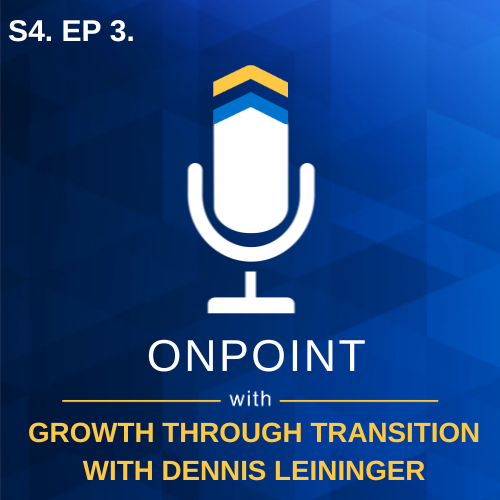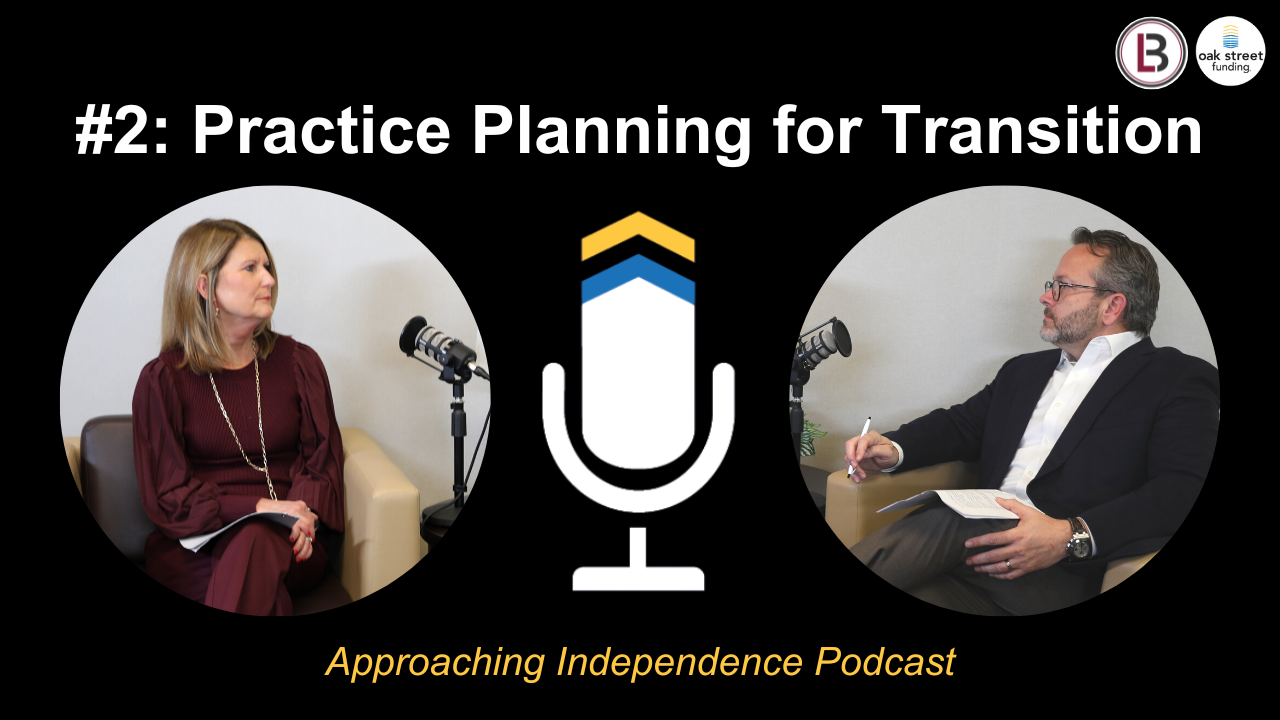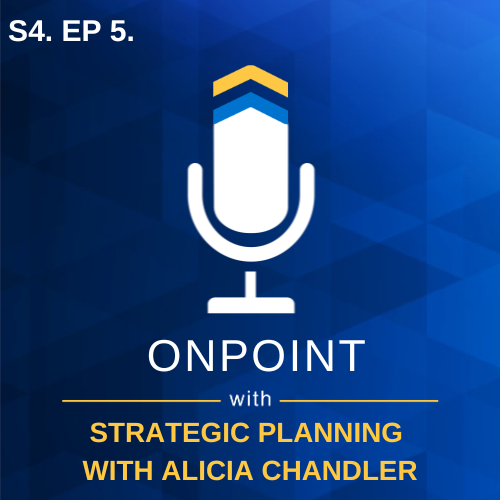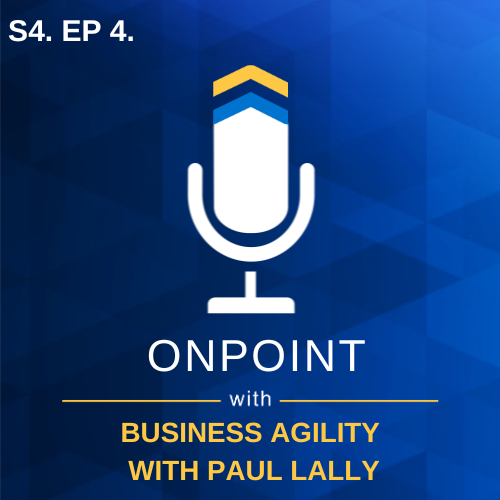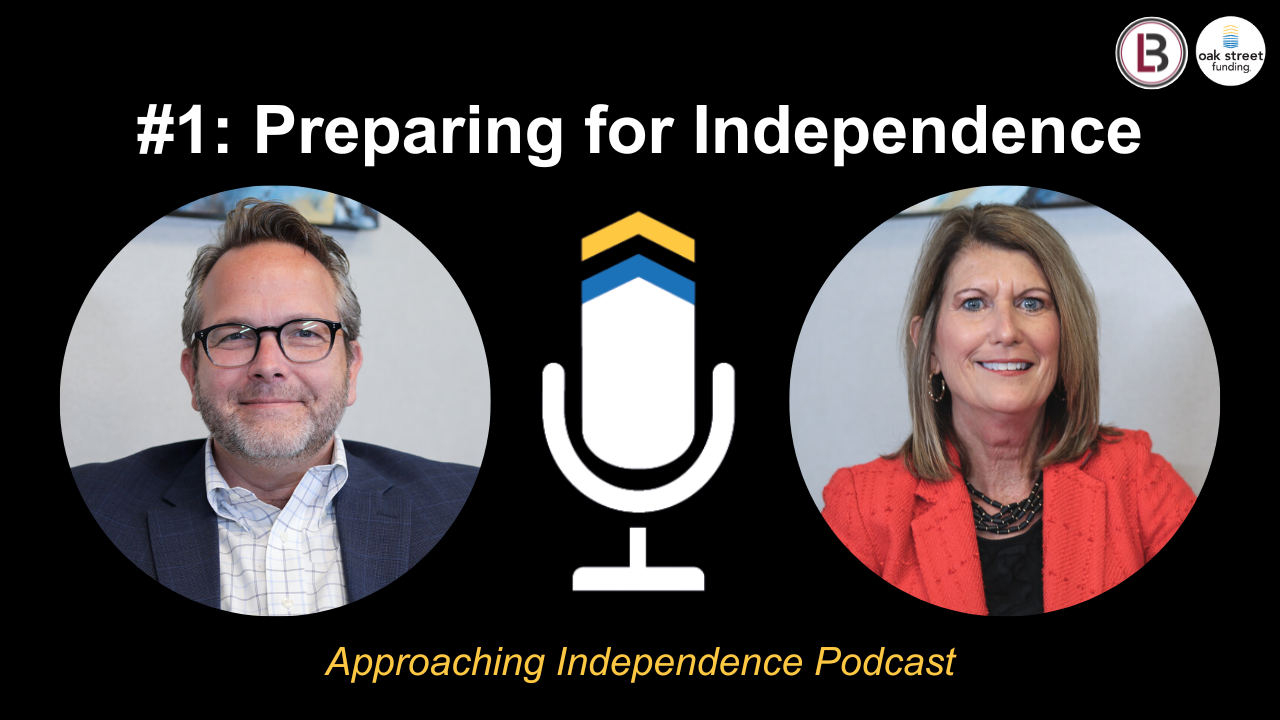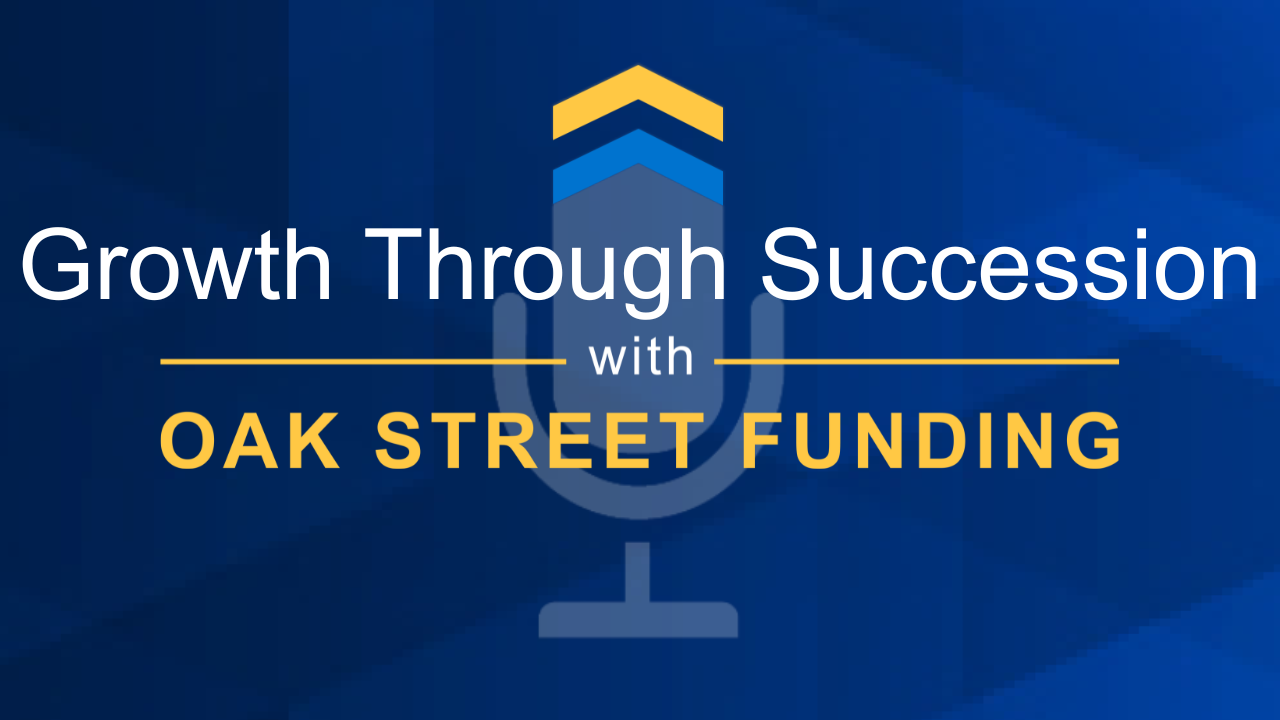S4. EP. 3 - Growth Through Transition with Business Transition Solutions
- 0.5
- 1
- 1.25
- 1.5
- 1.75
- 2
Bridget Haight: Hello and welcome to OnPoint, a podcast by Oak Street Funding, where we bring research and data- backed insights to dig into the minds of industry leaders to learn how to stand out, navigate, and break through this ever- changing industry. I'm your host, Bridget Haight, and you can support the podcast by following us on Spotify, Apple Podcast, on our website, or wherever you get your podcasts. We'll be there, hanging out, talking to industry leaders, and ready to empower you to grow your business. So let's get on point. Today, I am delighted to welcome Susie McEuen and Dennis Leininger to the show. Susie is vice president of strategic markets for Oak Street Funding, and Dennis is president of Business Transition Solutions. So today they're going to share ideas for growth and transition for financial advisor practices. Welcome to the show, Susie. Dennis, welcome.
Susie McEuen: Thank you, Bridget. So glad to be here. Dennis, this is actually, I mean, it's a privilege to have you with us today. I like to tell the viewers how long you and I have worked together. It's been probably going on almost six years, and we have worked with hundreds of advisors in situations where we're trying to support their growth and transition to independence or maybe transitioning to an RIA. And I think you and I work very well as a tag team because of the expertise that you bring into the industry. I think you and I have paralleled in our careers. You've got excess of 30 years, even though you look like you're 20, 30 years of experience and as a consultant. And I'm over 30 years, probably a little bit more than that, but I'll refrain from saying how many but of years of lending money. And I want to share to the viewers that, I mean, with your expertise, you are a CEPA, and that's a certified exit planning advisor, and you're also an ASCP, which is an accredited small business consultant. And so it's exciting for us to be together today and help maybe support our viewers as far as growth with M& A and also going independent. Bridget.
Bridget Haight: My gosh. High praise. It's so great to have you on the show, Dennis.
Dennis Leininger: Well, thanks very much for having me, and as we get into a later series of questions, I think we'll have an opportunity to illustrate how Oak Street and BTS, and Susie and I in particular, have worked together to get a good outcome for our mutual clients.
Bridget Haight: Great. Well, without further ado, let's just jump right into it, shall we? So let's start by talking about the first things you should do before a transition. So looking in the mirror, right? What should a financial advisor practice look at internally before deciding to buy or sell? Dennis, I'll go ahead and start with you.
Dennis Leininger: Yeah, let's go ahead and talk about the buyer first. I think it's important to understand exactly the type of practice that you want to buy, the makeup of it, the type of business lines. Just because it's different from yours doesn't mean that you shouldn't acquire it. If there's the opportunity to perhaps transition it or if it's a line of business that you want to get into, and it's a demographic of client that you're interested in, and also location, location is a key part of the decision, what you're going to target as far as an acquisition, it has to be a location you can serve. Sure, locally is great because you have an economy of scale to go ahead and bring that in. But it's really good to be able to take a look at another location as well. If you can get there to take care of clients occasionally in person, perhaps retain some of the staff with the practice that you are acquiring. And if it gives you a tollhold in an area where you can grow it into a footprint, then I think that's an excellent strategy to make with it. You need to look internally to see if you have the infrastructure to really take care of those additional clients. If you buy a practice with a hundred, 150 households, it's probably not going to be a big thing. If you buy a practice that has 600 households, it's going to put a lot of stress not only on you and maybe other FAs you have but also your CAs. And so you do need to stop and take a look at that and how you would meld that into your current activity. Financial, that's obviously a big part of it. It's good to find out how you might go ahead and finance something like this so you're not overly surprised later in a transaction. That might be a good point to talk with both your broker- dealer on what they can do to support you, but also then to reach out to someone like Susie at Oak Street Capital and talk about the possibilities there. So going into it, what it would look like and how you would approach it? And then lastly, I think you should talk to someone like me to understand what the seller is really looking for, because it's not just a financial decision. And if I could just talk briefly then about the seller, they've never sold their business before. This is something that they've worked for years and years and years to build. I've sold three of my businesses. I can tell you that it's emotional each time because you put your blood, sweat, and tears in it. You get up every day and do it. So you need to think about the emotional aspects of it, not just the logistical or financial aspects of it, and start thinking a little bit about what's important to you. And I'll tell you that more times than not, what's important to a seller is making sure that their clients are well taken care of. So that's going to be what they look at. On the other side, they should get a valuation from a fully accredited valuation company. With BTS, we work with three different valuation companies. We refer clients to those companies. We do not get referral bonuses or revenue sharing because we just simply want to stop referring people to them if they don't give our clients a good experience. But you should get a valuation not only to get a sense for what it is worth in the market but also to understand some of the value drivers that go into determining that valuation because that's what the buyers are going to be interested in asking you. And that's where the negotiation is. Much like when you sell a house, you can get an appraised value, and you might think that's the price. But to a buyer looking at it, if they see that they're going to have to replace the roof in a year, that cost of owning that house may change the price going into it. And as a seller, you need to be aware of what those things might be before you enter into discussions.
Bridget Haight: Great. All great points. Susie, do you have anything to add to that?
Susie McEuen: Yeah, no, Dennis, you... I mean, hit it on, spot on. And with our borrowers or buyers, when they're looking at buying a book of business or an RIA, it sounds really exciting. And the reality of it is, if they've never done this before, they really need to team up with Dennis, a firm like his Business Transition Solutions, and, like he said, reach out to an evaluation company. The key things are going to be that, as us, as a lender, and other lenders out there, we want to make sure they have their house in order, their financials in order. And if they've never done this before, this is not just a transaction, this is about a relationship. With Oak Street funding, we don't sell our loans, they say on our balance sheet, and we want to expand our relationship. We have the capital to lend up to 50 million. We're a conventional lender, which allows us to be a little bit more creative. And Dennis can probably detest to this, that, every deal that we look at or transaction or opportunity, they all look different. And so, as a conventional lender, we can be creative in helping that buyer, that borrower, get to the finish line. But I always enjoy, and I always encourage my clients or prospective clients that call in and go, " I've heard about you. I'm looking at a possibility of buying a book of business. I've never done this before." And I like that because I can help educate them from start to finish. I always then get Dennis involved with the transaction and say, " Dennis, they may need some consulting. They may need your help structuring, they may need help with performance," because with us being the lender, we've got to draw a line in the sand. But some of these advisors or RIAs don't realize that we do a lot of our own due diligence. We're checking to see if their ADV is clear and clean. We look at how long they've been in the industry. What do their financials look like? Are they paying their taxes on time? We look in the rearview mirror at their financial situation, but we also look in the future of what they're going to look like after they buy that book of business. And all those comments that Dennis said, " What is approaching that buyer and seller together? What's the chemistry? It's definitely like a marriage." And we want to make sure that at the end, post- closing, that it is going to be successful from not only the seller but the buyer as well.
Bridget Haight: Okay. Great. So my next question is, what are some of the common mistakes that buyers and sellers make in financial advisor practice transitions? Dennis, do you want to start off with that? Common mistakes?
Dennis Leininger: Yeah. Well, Bridget, that's a great, great question, and I'm going to kind of couple that with common mistake to the biggest mistake.
Bridget Haight: Good. Yes.
Dennis Leininger: Because the ones that are most impactful, and that's where we spend a lot of our time looking at that obstacle and making sure that it's going to be smooth sailing, and that gets to the messaging to the client and the whole client experience because the sale is contingent from both parties standpoint on the successful retention of those clients. And so I always say, " It doesn't matter what happens in the kitchen, it's all about a good dining experience," and we want to make sure that the clients have a really good experience throughout this. And so the client messaging strategy, engaging the seller and having them perhaps have a little incentive to make sure that it is a good transition. We'll get into that a little bit later as we talk about risk. And then, just having a really strong strategy and understanding, how are the clients going to hear this? How are they going to experience it? What about multiple contacts with the buyer? Because it's not just in that initial messaging, it's about what happens after, which you hear are things like, " Yeah, we had a good meeting six months ago, and then I never heard from you again." And so just downstreaming that entire process and thinking like that. Remember, these are not new clients. These are clients where a change has been perpetrated upon them, if you will. And so we need to handle them a little bit differently than we would existing clients or new clients. So that's a key part of it, just the whole transition part and making sure you don't move as a buyer too quickly with the sellers. The one that I've seen in all the years of doing this is, despite the coaching and them nodding their head that they understood is in that first meeting with seller, and buyer, and a client. The seller launched into how they do things differently, and they lost immediately 15% of their client base. And so you don't have to be afraid of that. You just need to not do that. So those are the types of things that we look at. And then just not having good documents, not having good communication, and good understanding of exactly what it is that you put together.
Bridget Haight: Okay. So the theme is communication. Don't make the mistake of not having good communication. Susie, do you have anything to add to that?
Susie McEuen: Yeah, I agree, Dennis, and recently experienced where the attorney that was involved in a transaction had never written up an agreement by sell agreement for an advisory firm. So that added some complexity and challenges because the attorney was trying to advise the seller in what they normally do in other industries. But as we both know, we all know that an independent advisory practice and an RIA is wrapped up a little bit differently. Communication is key. Being transparent is key. And I love buyers, borrowers, and sellers that are organized and they think out, definitely, a strategic plan, not only for the transaction as far as the buy- sell, but obviously, like you said, Dennis, with the clients, because that is going to what makes the whole thing successful, making sure those clients are aware and why this is happening. But also the staff, I mean, because the staff is a support behind the growth of the practice. And so I always say this, surround yourself with the experts. Don't depend on yourself being the buyer, the advisor, the RIA to know everything, get with Dennis, with his team, get with us early. We can, like you said, Dennis, provide names of valuation attorneys that can help put everything together.
Bridget Haight: Okay. I feel like we've been talking about this the whole time, but do you have anything else to add about minimizing risk, Dennis?
Dennis Leininger: Yeah, you're right, Bridget. This is about minimizing risk as we go through it. It's like you want to get across a tightrope, but you need to make sure that if you fall, there's something there to catch you, right? So the documents and making sure that they are fair and equitable for each party is a key portion of this. Some of the listeners may not know that it's possible that the seller will carry or could carry at least a portion of the sale price on a promissory note along with bank financing. And so understanding how that can be guaranteed and what happens if the seller can't make payments or if the market goes down and it puts too big of a strain on the buyer to make the payment that month, how is that going to work? What happens if the buyer passes or is permanently disabled? Is there a plan forward to who's going to take the practice or insurance coverage, a continuity plan in place so that there's a continuation of service and then, therefore, revenue? So all those kinds of things have to be looked at to protect the seller. From the buyer's standpoint, it's about due diligence, due diligence, due diligence, and making sure that they understand what they are buying. And so you need to look at the advisor and how they do things and what's their service model and how do they communicate to clients, what kinds of investment activities do they have those clients in? And then feel comfortable with the idea of how are you going to work with that client, knowing all those kinds of things. Not all FAs are created equal, and you don't have to be the same, but you do need to have a successful retention, and that means that you have to work with those clients, and they may not be a direct fit into your clients.
Bridget Haight: Okay. Do you have anything else to add about mitigating risks?
Susie McEuen: Yeah. Well, I think we add value as a lender, Oak Street Funding, because we have a processing team that we, basically, look under the hood of the car. We want to make sure that we can validate and verify the AUM, the revenue stream. We want to make sure that the demographics are aligned, and it's to protect the buyer and the seller, and also Oak Street Funding. So we work together, we get enough information from the buyer and the seller to do an analysis to get our client, the borrower, a term sheet. But we're going to ask for reports. We're going to ask for, if they are a 1099 advisor, 1099 tax returns. We will check taxes. We'll check UCC, uniform commercial code, see if there are any liens out there from other predators. So we are going to try to peel back the onion to make sure that there are no skeletons in the closet, and that is to help all of us. The one thing that we like when it comes to an M& A transaction, we like the seller to be involved post- closing. I think that is critical to make sure that the book sticks, that the seller is still involved to help with those client meetings, follow- up, one- on- ones, phone calls, that sort of thing.
Bridget Haight: Okay, great. Great advice. So what are the key terms to include in a practice purchase agreement? How do you evaluate a good structure? Dennis, I'll start with you on that.
Dennis Leininger: To come up with a good purchase agreement, I think it's absolutely necessary to have a good term sheet, a non- binding term sheet that really goes through all the aspects of the sale, the structure, obviously the price, the structure, the tax allocation, which I know we're going to get to in a little bit. If there's a lookback clause on this based on retention percentages, that's very clearly understood by both parties. Remember what one person says, is it necessarily what another individual hears, that the transition assistance that is going to be provided by the seller to the buyer is well- defined and not just haphazardly said? There should be a non- solicitation. A lot of times, it's too much to put a non- compete in something like this. Although, if you can, then you should. But a non- solicitation that is, again, well- defined, not just for not soliciting but really not working with the client base that's involved in the sale, is really important. A bill of sale that determines exactly what was sold, what was acquired, and the terms of payment, obviously need to be very well defined as well. And then, just how the transition is going to work involving the broker- dealer, et cetera.
Susie McEuen: And we always say to the buyer, borrower upfront, as soon as you have some kind of draft of a purchase agreement, or we can provide being an Oak Street Funding. Some of the things we're going to look for in the buy- sell agreement, reps and warranties, like Dennis said, non- solicitation. And one thing that we, as a bank, require is a subordination agreement if there's a seller note out there or an earnout. And so I try right up front to let my client, the borrower, know, if you're going to have a seller note or an earnout, we will require a subordination. And what that means is that we just are putting the seller on notice is that we're a creditor and the borrower is going to be paying them as well as us at the same time, that if there's not enough cashflow to cover both payments, we're paid first. So we try to get that all out. So that's what we always say to prospective clients, get us involved as soon as possible because we can help guide that through that process.
Bridget Haight: Okay, fantastic. So when buying or selling, we know that there are things to consider besides the terms and the partners. Dennis, what are the tax implications for buying or selling?
Dennis Leininger: Well, I'm not a CPA, but I talk with them daily on this, and that's one of the things that we do. But what we tend to do on this, I'm going to say that maybe 90, 95% of the sales we do are asset sales. And that positions the buyer to depreciate a portion of the sale price off over 15 years. Certainly, it doesn't make them rich, but it does ease the pain a little bit on the cash flow. And that's important to be able to make those payments. And the same tax consideration that does that also with today's laws will be long- term capital gains for the seller. And that tax allocation is goodwill. And for goodwill, we are seeing 90 to 95%. I've seen a couple 100%, although I think that's being pretty aggressive, but 90 to 95% seems pretty average. So that's a significant opportunity to get long- term capital gains and a significant opportunity to depreciate the sale price.
Bridget Haight: So let's give the listeners some real examples, and you've been doing this the whole time, so thank you for that, Dennis. Can you each provide an example of someone who had a successful transition and how they managed to get it right? Susie, I'll start with you.
Susie McEuen: Yeah. Actually, I have a few situations where they're very one, one was obviously an acquisition M& A, and then the other was a shareholder buyout. And shareholder buyout was an RIA. But talking or giving the example of the IAR, what I've seen is very successful is even with an RIA, if there's a advisor that is looking to retire, and let's say, for example, I know that advisor and we have known each other in the community, sometimes it works, I guess, I mean, really favorable, that if they can move that advisor over to either the RIA that's going to buy it or the independent advisor's book of business and just call it kind of like dating, where they haven't bought the book, but they're coming in under their brand, their marketing, and they're working, the buyer and the seller are working in tandem before they actually do the transaction. That way, the clients start to get to know that firm, get to know the buyer. That has been very, very successful because it seems like it just seems transparent. And that way, if it doesn't work out, there's not this transaction that occurred. Shareholder buyouts, I have worked with a number of different RIAs where NextGen is buying out the founder, and if they start early where they're buying in or they're buying incremental shares, and I've had a few that they start working with us as a lender 18 to 24 months before the transaction starts, we get to know our client really well. They get to know us. We're finding out through that process, how do they know to run a business? They're taking over, they were the advisors, now they're becoming the president and CEO. And if everyone starts early in that process, it really will be successful.
Bridget Haight: Okay. Dennis, do you have any examples of smooth transitions?
Dennis Leininger: Honestly, our point is just to make them all as smooth as possible. And I don't mean to, but there's always going to be bumps. Sometimes they break apart and come back together before the sale a little bit because they just get exhausted was trying to work everything out. Some people just don't have the stamina to really focus and do that. And I get that. Like I said, it's emotional for the seller, and for the buyer, it can be too because it's a large amount of money and a risk, and they're mine. But there was one that was fairly recent, and it's a good opportunity because Susie and I worked on this together, and she saved the day with it. And this may have been the one you were talking about, or just another one like it, where, actually, both the seller and buyer's attorneys stuck their nose way too deep into this and completely hijacked the situation. And it did cause that exhaustion with both parties. I'm trying to get a deal done because it disrupted, despite a good term sheet, it disrupted the communication and the understanding, and the trust level. And Oak Street was involved in providing funding for part of this, and Susie went above and beyond to talk with the seller and give their... here's some education as far as here's how this works, here's what this means, here's what we do, here's what we can provide. And just that reassurance. You don't think of the lender being involved that much, but that's why it's important to choose the right lender.
Susie McEuen: Thank you, Dennis. That's very kind. But it takes a village, and it takes teamwork.
Bridget Haight: So, Dennis, I like to ask a fun question at the end of OnPoint. If you could have one superpower, what would it be?
Dennis Leininger: Well, that's presumptuous. Why do you think I don't?
Bridget Haight: Do tell.
Dennis Leininger: I'd be the flash because I've got a lot to do and I look good in red.
Bridget Haight: You look good in red. Thanks, Dennis. And how about you, Susie? What would you choose?
Susie McEuen: Well, first thing that comes to my mind is Mighty Mouse trying to save the day, the old saying. And I actually dressed up as Mighty Mouse for Halloween one time. But I think as far as superpowers, time manipulation, going back in time, because, obviously, I've made some mistakes at some point in my lifestyle and lifetime. But also looking ahead, I'm one of those, I like to be prepared. I like to know what's going to happen, but also, I'd like to go back in time and go people that I've known that were experts and go, " How would you have done this?" Tap into their brain and just slowing father time down because it's moving too fast.
Bridget Haight: Great answers, very insightful. Dennis, thank you so much for joining us. Susie, thank you so much for being here.
Susie McEuen: Thank you. Thank you, Dennis. You're the best.
Bridget Haight: Well, thank you all for listening to OnPoint, a podcast by Oak Street Funding, where we bring research and data- backed insights to dig into the minds of industry leaders to learn how to stand out, navigate, and break through this ever- changing industry. I'm Bridget Haight, and tune in next time wherever you listen to podcasts as we get on point. Don't forget to subscribe and leave us a review.
DESCRIPTION
Today I am delighted to welcome Susie McEuen and Dennis Leininger to the show! Susie is vice president of strategic markets for Oak Street Funding. Dennis is president of Business Transition Solutions. Today, they are going to share ideas for growth and transition for financial advisor practices. Welcome to the show!
Today's Host

Bridget Haight
Today's Guests

Susie McEuen


